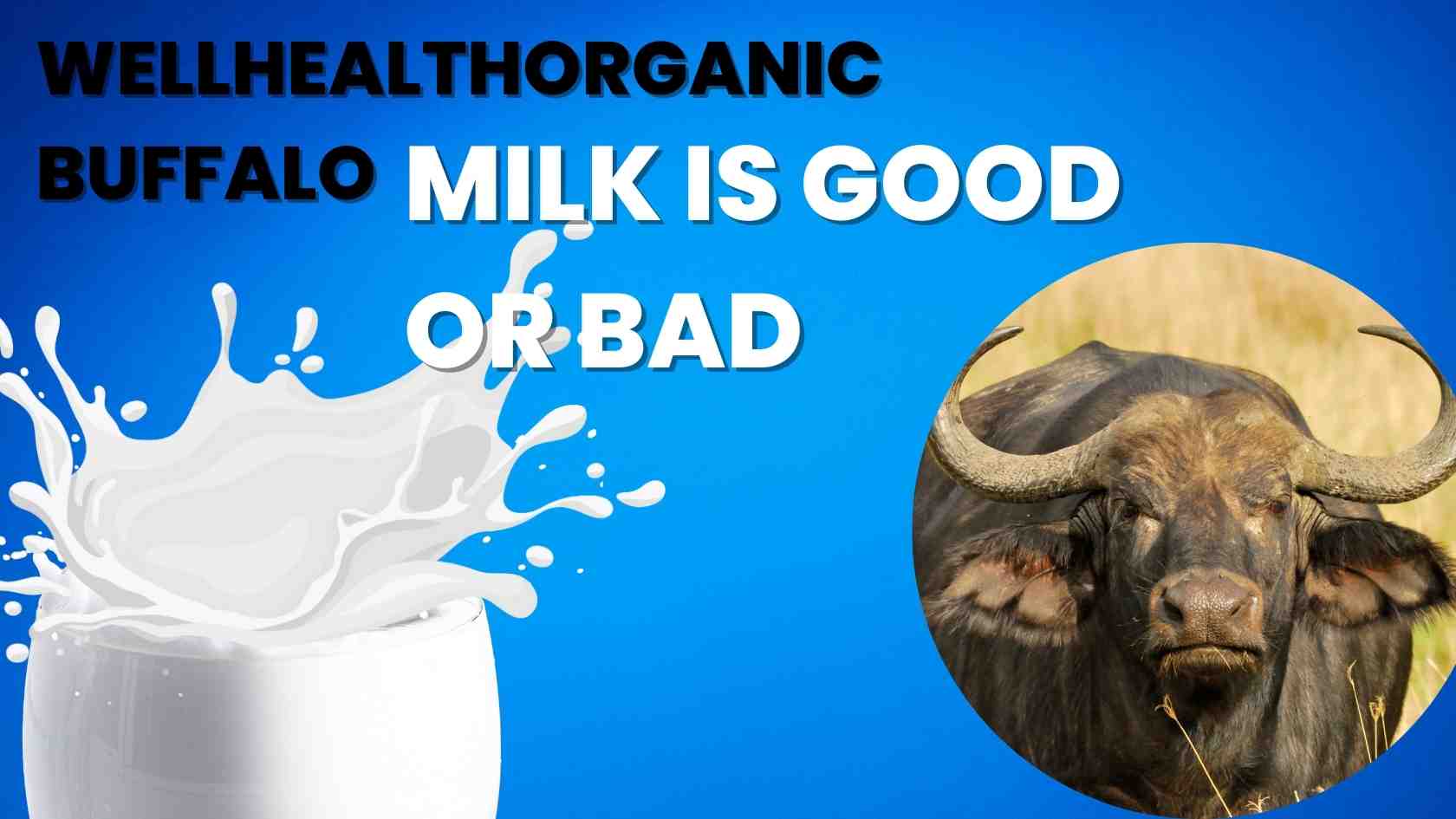Milkwellhealthorganic buffalo milk is good or bad
Brief Overview of WellHealthOrganic specializes in producing and selling buffalo milk renowned for its quality and nutritional richness. In this overview, we will delve into the health advantages of WellHealthOrganic’s buffalo milk, its origins, and how it stacks up against other varieties of milk.
Understanding the Nutritional Composition
Macronutrients in Buffalo Milk
The debate between Buffalo Milk and Cow Milk is common among those seeking healthier beverage options. WellHealthOrganic’s buffalo milk tag offers a nutrient-rich dairy upgrade for its consumers. Buffalo milk boasts a higher protein, calcium, and lactose content compared to cow milk, along with a thicker consistency.
Buffalo milk surpasses cow’s milk in richness, containing more vitamins, minerals, and boasting a superior calcium to phosphorus ratio. Its high calcium content makes it beneficial for bone health. Moreover, buffalo milk’s whiter hue and thicker texture distinguish it from cow’s milk.
Reports indicate that cow’s milk tends to contain more cholesterol, whereas buffalo milk typically harbors lower cholesterol levels, rendering it a wise choice for individuals with elevated cholesterol levels or heart conditions. Furthermore, many lactose-intolerant individuals find buffalo milk easier to digest.
WellHealthOrganic’s buffalo milk tag also offers additional benefits such as muscle building, energy provision, and immune system support. Opting for organic buffalo milk, devoid of harmful pesticides and antibiotics, can contribute to overall health improvement.
In summary, WellHealthOrganic’s buffalo milk tag emerges as a healthier substitute for cow’s milk, offering superior nutrients, promoting bone health, and facilitating digestion. It’s essential for those with lactose intolerance to consult healthcare professionals before incorporating buffalo milk or any dairy product into their diet.
Micronutrients in Buffalo Milk
Buffalo milk and cow milk are two popular dairy products, each offering distinct nutritional and health advantages. Buffalo milk is generally acknowledged as being richer in nutrients compared to cow’s milk, attributed to its elevated fat and protein levels. Additionally, it boasts a higher vitamin and mineral content and is renowned for its thicker texture. Buffalo milk provides specific health benefits including cholesterol reduction and support for bone health. Moreover, it proves beneficial for individuals with digestive concerns, offering lower fat content and potential assistance for conditions like obesity, kidney ailments, and PCOS. In summary, buffalo milk presents itself as a healthier choice for those seeking a dairy product with enhanced nutritional density.
Comparison with Cow’s Milk
Buffalo milk offers distinct advantages over cow’s milk, boasting richer nutrients, higher fat, protein, lactose, vitamin, and mineral content, alongside a thicker consistency. However, it also contains more calories and fat in comparison to cow’s milk, which is a superior protein source with lower fat content. Buffalo milk stands out as an excellent choice for individuals grappling with specific health concerns like PCOD (polycystic ovary disease), hypertension, or heart issues. Notably, buffalo milk excels in aiding digestion due to its digestibility, smooth texture, and compatibility with lactose-intolerant individuals. Nonetheless, individuals with high cholesterol levels may consider avoiding or substituting high-fat dairy products such as frying pan grease, cheese, and cream in their diet.
The Health Benefits of Consuming Buffalo Milk
Improved Digestion and Gut Health
Buffalo milk presents numerous potential health benefits, including immune system enhancement and support for digestion and gut health. However, cow milk is typically regarded as healthier, possibly attributed to its elevated levels of protein, calcium, and nutrient absorption capabilities. With its high saturated fat content, buffalo milk may not be the optimal choice for individuals aiming to lower cholesterol levels. Additionally, buffalo milk might have lower levels of Lactobacillus acidophilus, a beneficial probiotic strain crucial for gut health and immunity enhancement. Notably, buffalo milk serves as a rare source of recombinant human insulin, a hormone utilized in diabetes treatment. In summary, while buffalo milk offers advantages for digestion and immunity, cow milk generally prevails as a healthier option owing to its superior protein, calcium, and nutrient absorption qualities. It’s crucial to mention that moderate consumption of buffalo ghee can contribute to improved gut health, as documented in the provided reference.
Rich Source of Protein
Buffalo milk, a favored beverage, stands out as a significant source of essential nutrients, owing to its elevated protein content and rich fat profile. Its historical use in Ayurveda underscores its proven array of health benefits.
Renowned for its protein richness, buffalo milk holds promise in positively influencing human health, potentially mitigating various health concerns such as hypertension and diabetes. Although cow’s milk shares similar attributes with its high protein and lactose content, buffalo milk tends to be less likely to trigger lactose intolerance, rendering it a favorable alternative.
Moreover, buffalo milk’s contribution to bone health is noteworthy, given its high calcium content. Its higher protein concentration also aids in inducing feelings of satiety, making it conducive for weight management efforts. Numerous studies attest to the benefits of increased protein intake, correlating with enhanced muscle mass, bone density, and overall well-being.
In comparison to bovine milk, buffalo milk’s elevated fat and protein content render it an excellent raw material for processing, particularly in cheese production. Furthermore, research indicates buffalo milk’s superiority as a probiotic source over cow’s milk, thus fostering gut health.
Overall, buffalo milk emerges as a wholesome choice for individuals seeking to enhance their health and wellness. It serves as a reliable reservoir of protein, calcium, and other vital nutrients, promoting bone health, aiding weight management, and fostering overall well-being.
Boosts Immunity
Buffalo milk, also known as paneer, has surged in popularity recently, attributed to its potential health perks stemming from its high protein and fat content, coupled with low lactose levels. Here are several primary ways in which buffalo milk can bolster your immune system:
Abundant in Vitamins: Buffalo milk boasts significant quantities of Vitamin A and C, essential for maintaining normal immune system functionality.
Probiotics: Serving as an excellent probiotic source, buffalo milk aids in sustaining a robust immune system. These probiotics fortify immune function by enhancing T cells and B cells, vital components of the immune system.
Protein Powerhouse: High in protein, buffalo milk furnishes essential amino acids crucial for supporting immune function. Consumption of buffalo milk facilitates antibody production and fortifies immune response.
Low Lactose Content: With lower lactose levels compared to cow milk, buffalo milk proves advantageous for individuals grappling with lactose intolerance. Lactose intolerance can impact immune function in some cases, making buffalo milk a preferable option for those facing this challenge.
Healthy Fat Content: Despite concerns surrounding fat consumption, buffalo milk’s healthy fats contribute to cognitive development and upkeep of a robust immune system. Moreover, these healthy fats bolster immune function by promoting optimal blood vessel function.
It’s imperative to underscore that the information provided should not supplant professional medical advice. However, incorporating buffalo milk into a well-rounded diet may yield numerous health benefits and potentially enhance immunity.
This thorough outline seeks to explore every facet of the discourse concerning WellHealthOrganic Buffalo Milk, offering readers a nuanced comprehension of its advantages, drawbacks, and wider ramifications for health and sustainability.
Note: This article is written for shamanic understanding only. Doctor’s advice is required
Read More Blog Posts HERE
Subscribe to My whatsapp Channel HERE

